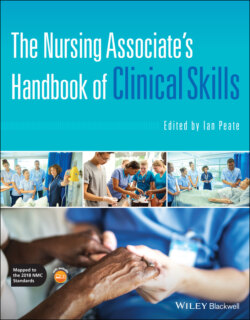Читать книгу The Nursing Associate's Handbook of Clinical Skills - Группа авторов - Страница 29
Green Flag
ОглавлениеThe Nursing and Midwifery Council (NMC) (2018) Standards of proficiency for nursing associates
The NMC standards of proficiency require the nursing associate to understand the importance of courage and transparency and apply the duty of candour, recognising and reporting any situations, behaviours or errors that could result in poor care outcomes (Platform 1: Being an accountable professional; 1.3)
Relational context includes the historical and current relationship you have with an individual. The nursing associate will communicate differently with colleagues compared with family and friends and similarly with people they have just met versus someone they have known for some time. Early interactions are more likely to be governed by the social context of rules and norms but these maybe less apparent as relationships develop. Consider the nursing associates differing response when a patient says ‘Get me a drink’ compared to if a partner were to say it.
Figure 1.3 Transactional model of communication.
Source: Adapted from Barnlund (1970).
Cultural context includes, for example, ethnicity, gender, nationality, sexual orientation, class, ability and ethnicity, and we all have multiple aspects of cultural identity which influence our communication. The nursing associate needs to be aware of unconscious bias, as it harms patients and staff (Kapur 2015). Unconscious (or implicit) bias occurs when the way information is processed is influenced by stereotypes, and, therefore, those stereotypes impact actions and judgements. A stereotype is a belief that associates a group of people with certain traits or characteristics and is a prejudgement of a person based on the group they are associated with. Unconscious bias is a natural method of cognitive processing, so we all possess it. In healthcare, unconscious bias can lead to false assumptions and negative patient outcomes, especially in minority groups. An example might be that the nursing associate inadvertently spends less time with the patient with mental health issues because of the stereotype they hold that all people with mental health issues are violent. It is important for the nursing associate to be aware of unconscious bias and, while it will always exist, develop strategies to overcome it.
